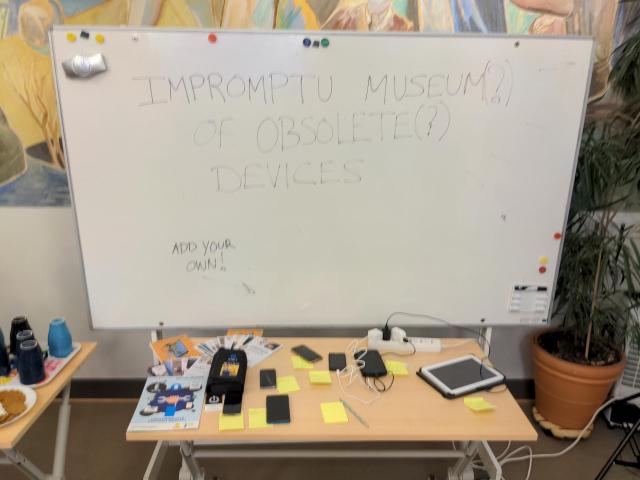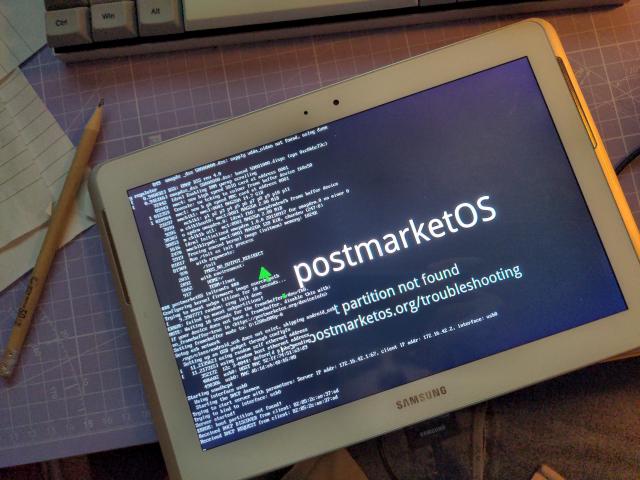The Impromptu Museum(?) Of Obsolete(?) Devices

On the 10th of December, I took part in the Institute For Degrowth Studies’ Get To Know Degrowth event series in Malmö. The series tries to introduce people new to degrowth to some of the concerns and ideas behind it. This particular edition was focused on how consumer electronics become rapidly obsolete, with a focus on smartphones and laptops.
Jessika Richter represented Repair Café and spoke about why repair makes sense ecologically but not economically and what specific challenges devices like smartphones presented. She covered supply chains, e-waste and regulations.
I used solar.lowtechmagazine.com to discuss software-induced device obsolescence. Specifically, how we designed that site with the intent to support at least 10-year-old devices as a way to discuss the material and energy impacts of software and how design decisions can have an impact on that.
After the talks, there were two short workshops, one about how to assess how repairable a smartphone is by Jessika. This involved participants looking at their phones for the presence of removable batteries or screws (good signs!) and looking at online resources like ifixit.com.
Impromptu Museum(?) Of Obsolete(?) Devices
For the workshop, I tried a bit of an experiment and asked participants to bring their old smartphones and tablets to the event so we could make an Impromptu Museum(?) Of Obsolete(?) Devices. With the intention to gather different stories and use the device’s (non)functionality as a starting point for discussions on (planned?)device obsolescence.

I had brought some of the devices that I had kept over the years or found in bins. With the devices, people could poke around and experience the specific ways in which smartphones and tablets become obsolete. All devices were in good shape hard-ware wise:
-
a Samsung Galaxy Tab 2 10.1( 2012) running LineageOS from 2020.
-
a Samsung Galaxy S2 (2011). Running Postmarket OS form 2023
-
a Samsung Galaxy Mega 6.3 (2013) running Samsung version of Android Kitkat c.a. 2014.
-
a Samsung Galaxy A3 (2015) running Samsung version of Android Nougat c.a. 2019 .
As a means of comparison, I asked participants to both try to load solar.lowtechmagazine.com and some of their favorite sites.
solar LTM loaded well and quick, even on the Samsung Mega with a 2014 browser that other sites would just not load on.
The Galaxy Tab was practically unusable because the 2020 LineageOS interface slowed everything down to a crawl. People tried to open instagram on it, but it took so long to load, people just gave up.

The Samsung Galaxy S2 was surprisingly snappy and would load all kinds of sites, but the “phone” is otherwise unusable due to missing firmware for audio, haptics, and modem.
The Galaxy A3 ran extremely slow, but would still load stuff.
Some devices brought by the participants included a 2008 Macbook Pro running the last MacOS version still supported. No issues there, very powerful computer. However, it had to be replaced because it was not powerful enough for the specific workloads for $DAYJOB.
Another was a Fairphone2 which was replaced after the public transport company’s app refused to run on the outdated OS. Moreover, the phone would end in boot loops because the battery did not carry enough charge anymore. That is something you can fix, but there was no point given the software.
An iPhone 5s was replaced after it stopped receiving updates and crucial apps would no longer run on it. Here again, aside from the battery, the phone was in good condition.
The idea of asking participants to bring a number of devices for the Impromptu Museum worked well as a workshop method. Everyone had stories of having to part with good devices they had paid a lot of money for because they were either too expensive to repair or because they couldn’t get crucial apps to run on it any longer. The close link to Repair Café meant some people intended to bring some devices to a next edition of the Café. For future, longer, workshops, it would be interesting to perhaps discuss what function (besides paper weight) these devices can still have.